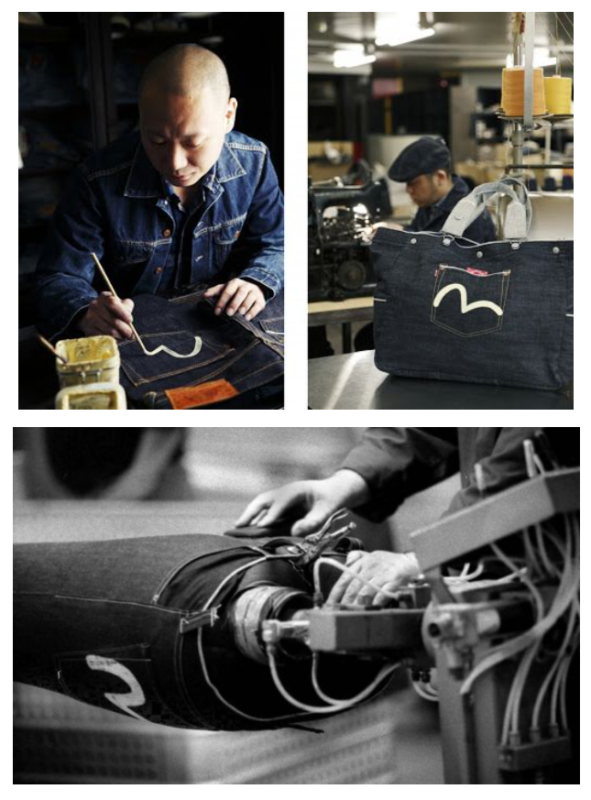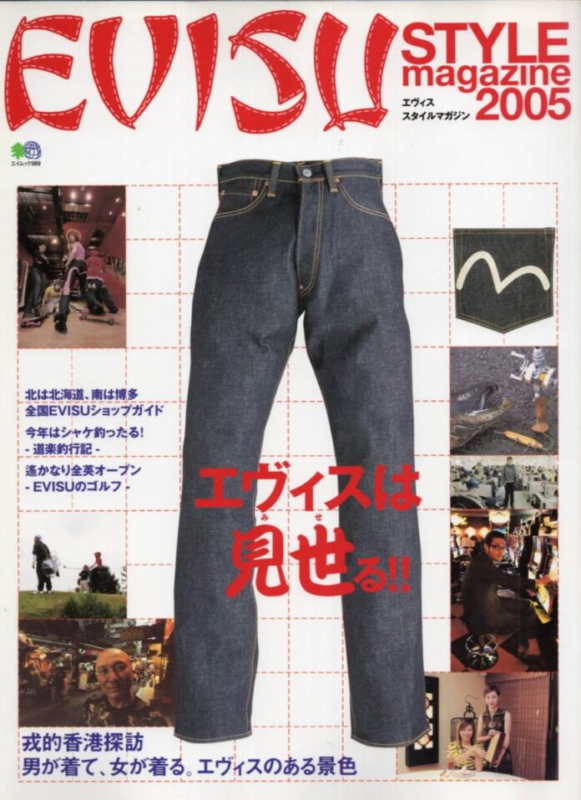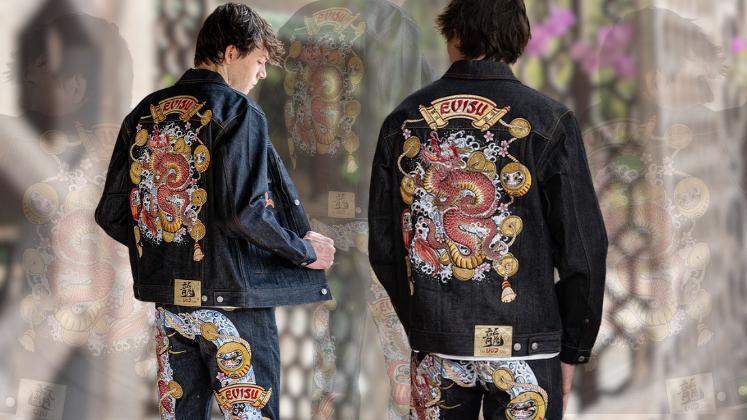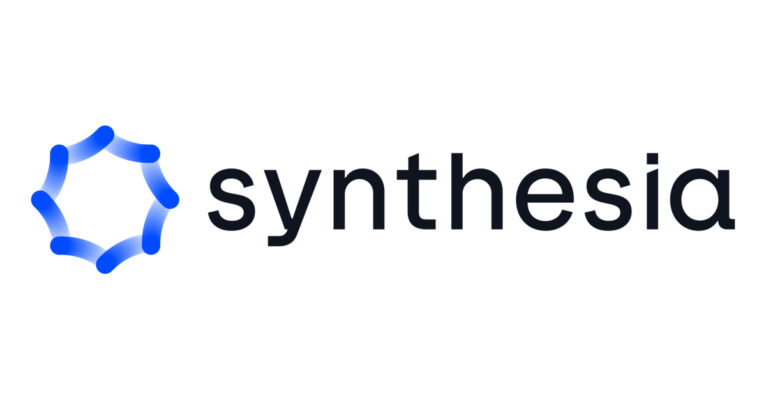By Dandy Nguyen – Jan 31, 2024
In Japan, Evisu jeans adorned with the image of seagull wings on the back have long been a monument in the fashion world. Day by day, these wings not only stay grounded in the Land of the Rising Sun but also soar globally.

The era shapes an icon
Since the 1950s, denim sourced from the United States became one of the most beloved and widely used products in Japan. However, Japanese affinity for American denim waned gradually for two main reasons.
Firstly, renowned brands like Levi’s and Wranglers were tailored to Western male proportions, making them ill-fitting for Japanese men. To address this issue, most Japanese men who bought American denim products would take them to tailors for adjustments to achieve a better fit. However, this method was time-consuming, and if the tailor lacked skill, it could compromise the original design of the product.


Secondly, despite the immense success of Levi’s and Wranglers in the 1970s, the quality of American denim gradually declined due to increasing demand. As an economic rule, when demand rises but prices remain constant, quality tends to decrease. Consequently, American denim sold in Japanese fashion stores became thinner, lacking the thickness of earlier batches. This dissatisfaction prompted Japanese designers and brands to take matters into their own hands and produce “Made in Japan” denim with robust fabric and intricate patterns, such as Studio D’Artisan, Denime, Full Count, Warehouse, and others. Then, in 1991, Hidehiko Yamane founded the Evisu brand.

Meticulous production process
In 1991, Hidehiko Yamana left his job as a tailor to devote himself to his brainchild, Evisu. Before its establishment, Yamane and his colleague Mikiharu Tsujita (who later founded the denim brand Full Count) spent a considerable amount of time researching vintage denim styles to create durable and high-quality jeans.

Yamane and Tsujita aspired to create authentic and fortunate denim jeans, and their efforts bore fruit. Yamane went to great lengths to find vintage American looms capable of weaving 40 meters of fabric in a day; these were machines discarded by Levi’s in the 1950s and had been unused for 40 years. For the creation of his jeans, Yamane chose cotton thread to provide a natural color, a comfortable feel, and easy wear for the wearer. However, this type of fabric was prone to tearing, requiring meticulous and careful work from the craftsmen in the production process.

The denim pieces were then dyed with an old-fashioned indigo dyeing machine, followed by sun exposure on the roof of the Osaka workshop to oxidize the indigo color before being immersed in the next dyeing bath. Each product was dyed at least 16 times, and it took up to 30 dyeing sessions to achieve the deep blue color characteristic of traditional denim. Additionally, Yamane researched and cultivated a specific type of indigo plant to create the desired dye color.
All Evisu jeans are hand-sewn, creating a seam that connects both sides of the pants and cuts straight to the pants’ edge, which is then pressed flat. Therefore, when cuffing the pants, you can see the two edges sewn together. Each pair of jeans has 23 special details. Due to the time-consuming production process to create a quality product, only 14 pairs of Evisu jeans are “produced” per day, explaining their high price.

Seagull Wings – Evisu’s symbol
When talking about Evisu, one immediately recalls the seagull wings symbol (resembling the letter “M”) painted on the back of each pair of jeans. When Evisu was first introduced, Yamane personally used a brush with white paint to draw the letter “M” on the back pockets. For him, these were abstract representations of seagulls. In W. David Marx’s book ‘Ametora,’ Yamane candidly says, “This drawing was just a rough joke because I never thought anyone would buy them.”


Regarding the brand name, initially, Yamane named it Evis. However, this name bore similarities to Levi’s and could potentially lead to legal disputes. Therefore, he changed the name of his brainchild to Evisu, based on the name of a Japanese Buddhist deity (Ebisu), often depicted with a child and a fishing rod. Fishing is also Yamane’s hobby. The image of this deity is also printed on the leather patches of Evisu’s raw denim jeans.


Taking the Evisu seagull wings to new heights
Regarded as one of the first “designer” denim brands with unique silhouettes and distinctive features, Evisu gained special favor in the Japanese market. Meanwhile, Western giants like Calvin Klein and Tommy Hilfiger had not fully delved into complete production for jeans. They merely attached their brand labels to products manufactured by other factories, whereas Evisu did everything from start to finish. A “Made in Japan” product from beginning to end, ensuring the expected quality, Evisu became even more celebrated in the Japanese market.

Seven years after opening its first store in Osaka, Yamane continued to expand the brand with a subsidiary for women called Evisu Donna. Moving into the early 2000s, the founder of Evisu ambitiously sought to introduce his passion globally. Thus, he approached Peter Caplowe, a businessman in Hong Kong, to organize a fashion trade show called The Hub. From this initial step, Evisu’s unique and colorful jeans first reached the hands of fashion enthusiasts in London and New York. Gradually, Evisu transcended Japan’s borders, entering the global market: Europe, Hong Kong, and the Mainland – presently with a presence in 400 stores and major retailers worldwide.
Yamane’s influence continued to expand, reaching into street fashion and hip-hop when embraced by many rap artists of that era. Rappers like Jay-Z wore Evisu jeans in music videos such as “Show You How” and “Jigga That N*gga,” or Lil Wayne in “Lock & Load,” captivating youth and hip-hop enthusiasts who relentlessly sought these iconic seagull jeans. At one point, football legend David Beckham also caused a stir with a limited edition pair of Evisu jeans adorned with 18-carat gold buttons and rivets.

There were times when Evisu experienced a slowdown and nearly faded into obscurity, but it quickly revived through collaborations with Palace and endorsements from new-generation rappers like Travis Scott. Today, Evisu continues to expand its product range with various types of jeans, including Bondage jeans, Evisu European Edition, Diacock Vintage Cut for Europe, Kizzu, Limited Edition, and more. Additionally, there is the Milenium Jean, a type of jeans produced by Yamane in 2000 with a 22k gold button, packaged in a wooden box, and priced around £1,200 per pair.
Website : https://www.evisu.com/














+ There are no comments
Add yours